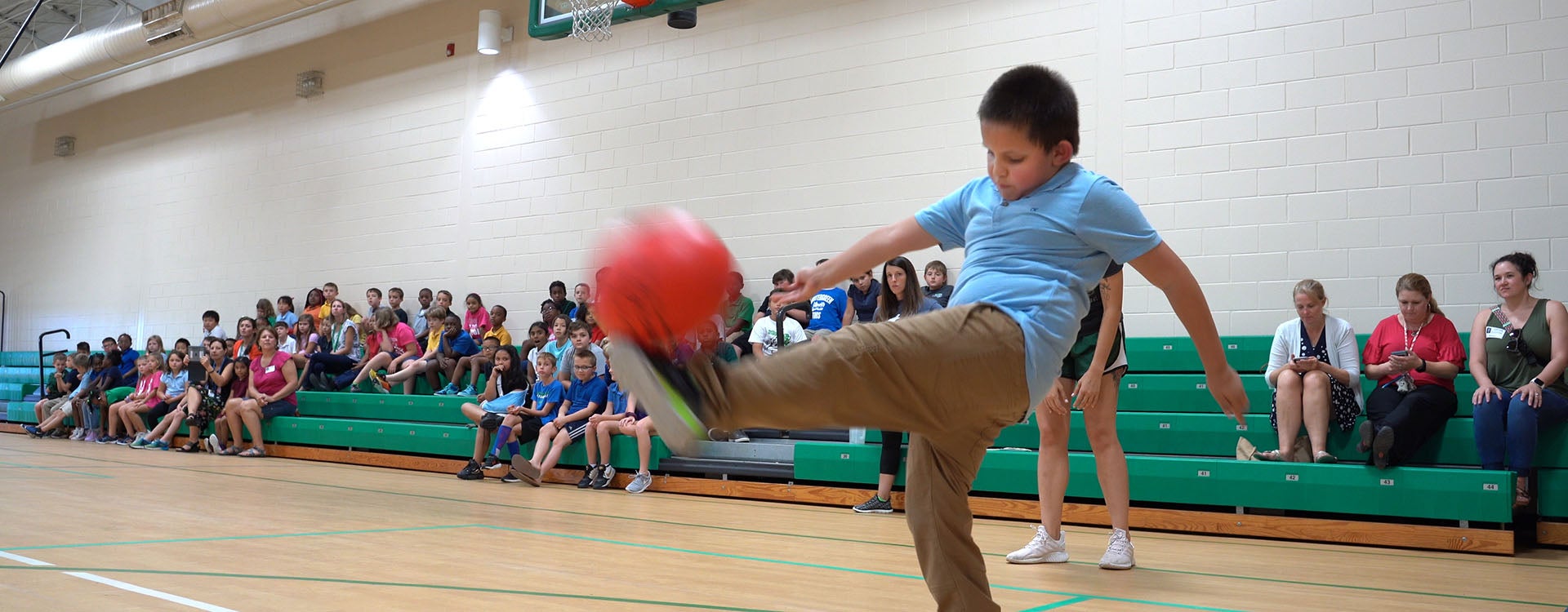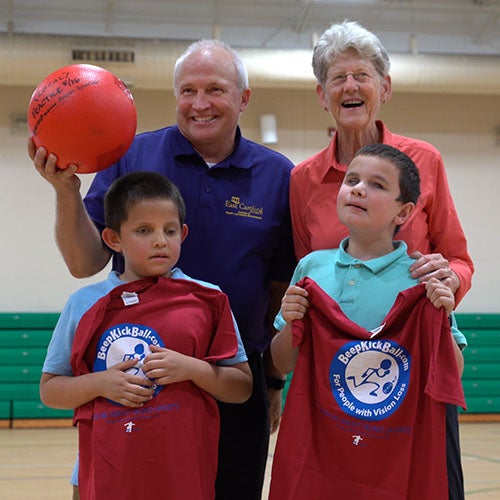Design for Disability initiative kicked off with a kickball game
Judy Byrd has three goals.
“I want every child to be included in their PE class. I want every child to have the opportunity to learn how to play sports. And I want every child to make physical activity a part of their daily lives,” she told students and faculty at the College of Health and Human Performance’s Design for Disability kickball kickoff.
Byrd is a 1972 graduate of East Carolina University and the creator of beep kickball for individuals with visual impairments. The ball makes a beeping noise, while bases buzz, to help players kick, locate the ball and score runs. It’s one of her contributions to achieving those goals.
“I stumbled into creating the beep kickball,” she recalled. Byrd volunteered with the Center for the Visually Impaired in Atlanta and helped launch a beep baseball team. That game is played by older teens and adults.
“I realized that kids needed something to play,” Byrd said. “And the answer was the same game, different ball. A kickball. I thought it would be easy to find a ball on the market that worked, but I couldn’t. So I bought one that didn’t work, cut it open and tried to fix it.”
One year and 25 design iterations later, she had a working ball. “But I didn’t know if kids would like it, so I made five prototypes and sent them to Camp Abilities, a sports camp for children with visual impairments, and asked for feedback. The kids loved it!”
Then, with an assist from the National Beep Baseball Association, she created the game. Next, Byrd contacted schools and camps for the blind. “The reaction was enthusiastic. The need was so great. I never had to sell them on it,” she said.
ECU students and faculty had a chance to experience beep kickball for themselves during Byrd’s visit to campus. Players donned blindfolds, used in all games to help equalize players’ vision, and used their sense of hearing to kick and field the ball and make it to the bases.
Byrd, HHP faculty and students from the recreational therapy and adaptive physical education programs also visited Wintergreen Intermediate School in Greenville for a game. Students in second through fourth grades gathered in the gym for their first game of beep kickball.
Michele Mazey, Wintergreen’s lead adaptive PE teacher, said, “This was so much more than a kickball game for our students. This was an opportunity for our blind students to be together and play. They’re in different grades and don’t always get time together. And it was a bonding time for all of the students and teachers. The lives of every single person in that gym were changed by this event. It’s amazing what time together, a beeping ball and the courage to try can do.”
The kickball kickoff launched the college’s Design for Disability initiative, which focuses work on four pillars: research and innovation, training and education, product design and inclusion and access.
“Judy’s beep kickball was a wonderful way to demonstrate the four pillars,” said David Loy, associate professor of recreation sciences and Design for Disability leader.
“Today’s event helped train students and current practitioners on how to work with individuals with visual impairments. And we raised awareness about the abilities of those with visual impairments. We discussed research partnerships and investigating how beep kickball might be used to improve the accuracy of participants’ ability to locate sound. Finally, Judy met with campus resources to help ECU become a partner in designing future products for beep kickball,” he explained.
Anisa Zvonkovic, HHP dean, said “Our college is focused on improving the well-being of people in the region and beyond. We see this disability initiative as showcasing how all of the units in the college work alongside people with disabilities to create conditions in which they can thrive. Different areas come together here, understand each other’s work and together help improve quality of life for everyone.”
Upcoming work will highlight how limitations of human movement and the body can be surmounted and how people grow over time, she said. Future events include a documentary film festival and a celebration of the 30th anniversary of the Americans with Disabilities Act.
-by Kelly Rusk, University Communications
-Video by Reed Wolfley, ECU News Services

